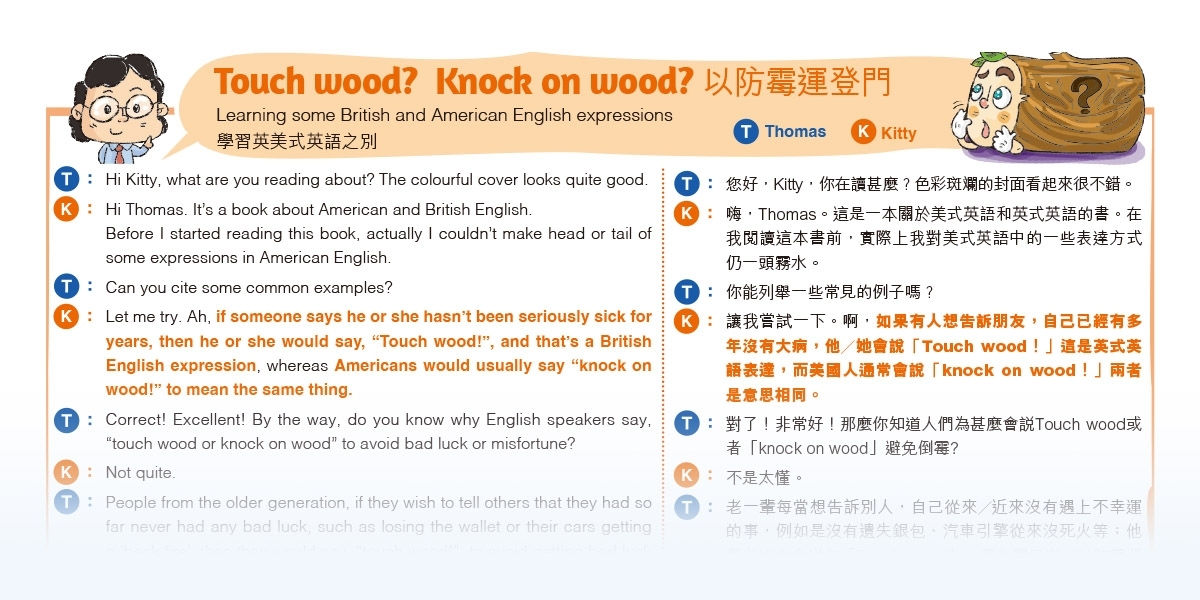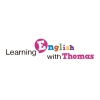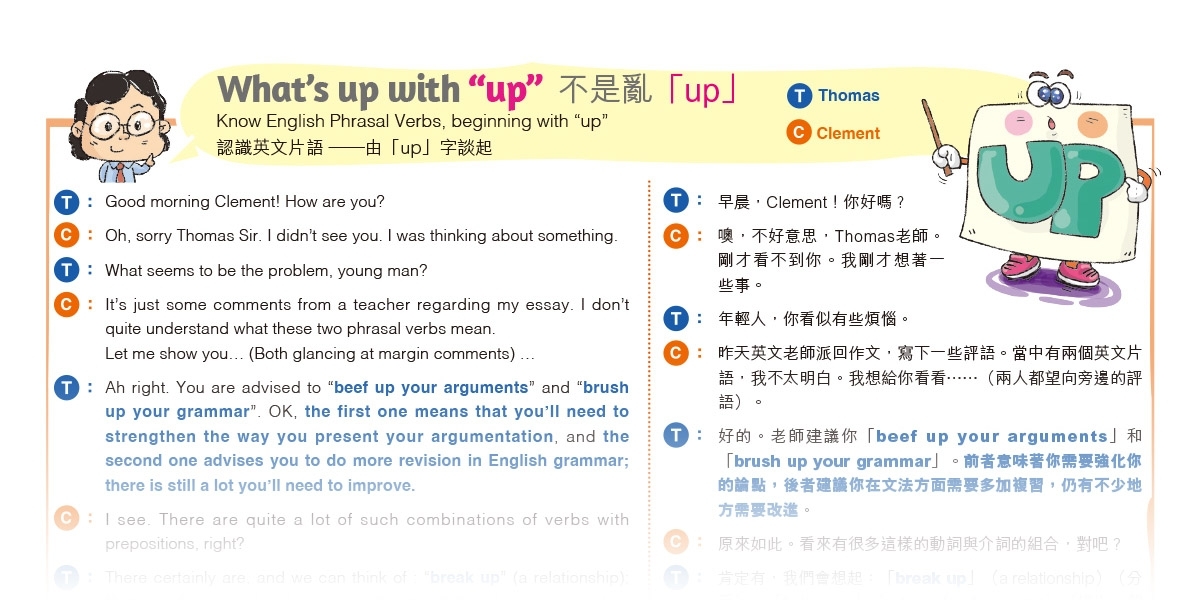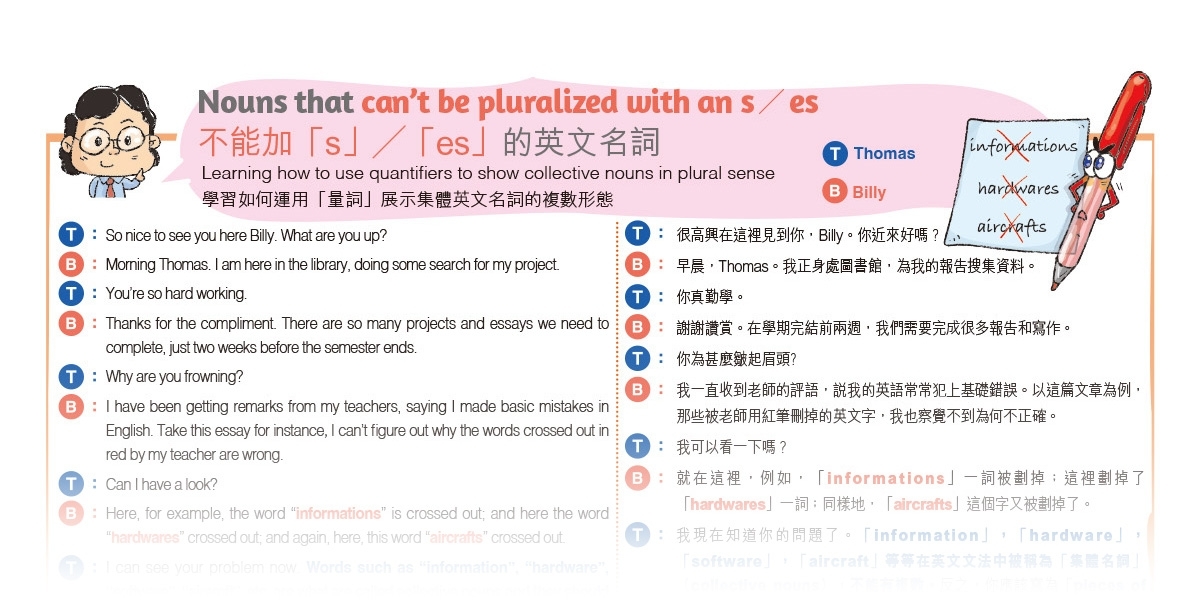昔日文章


Learning English with Thomas
2023.02.19
Touch wood? Knock on wood?
以防霉運登門
Learning some British and American English expressions
學習英美式英語之別
T: Thomas J: Kitty
T : Hi Kitty, what are you reading about? The colourful cover looks quite good.
K : Hi Thomas. It’s a book about American and British English.
Before I started reading this book, actually I couldn’t make head or tail of some expressions in American English.
T : Can you cite some common examples?
K : Let me try. Ah, if someone says he or she hasn’t been seriously sick for years, then he or she would say, “Touch wood!”, and that’s a British English expression, whereas Americans would usually say “knock on wood!” to mean the same thing.
T : Correct! Excellent! By the way, do you know why English speakers say, “touch wood or knock on wood” to avoid bad luck or misfortune?
K : Not quite.
T : People from the older generation, if they wish to tell others that they had so far never had any bad luck, such as losing the wallet or their cars getting a ‘back fire’, then they would say, “touch wood!”, to avoid getting bad luck that may be just around the corner waiting for them.
K : I see.
T : As a matter of fact, there is also a similar usage in Chinese, namely, “toi-lai”, meaning literally. “relying under the protection of external force”.
K : That’s very interesting. (Thomas nodding smilingly)
T : 您好,Kitty,你在讀甚麼?色彩斑斕的封面看起來很不錯。
K : 嗨,Thomas。這是一本關於美式英語和英式英語的書。在我閱讀這本書前,實際上我對美式英語中的一些表達方式仍一頭霧水。
T : 你能列舉一些常見的例子嗎?
K : 讓我嘗試一下。啊,如果有人想告訴朋友,自己已經有多年沒有大病,他╱ 她會說「Touch wood!」這是英式英語表達,而美國人通常會說「knock on wood!」兩者是意思相同。
T : 對了!非常好!那麼你知道人們為甚麼會說Touch wood或者「knock on wood」避免倒霉?
K : 不是太懂。
T : 老一輩每當想告訴別人,自己從來╱近來沒有遇上不幸運的事,例如是沒有遺失銀包、汽車引擎從來沒死火等;他們之後也會說句「Touch wood」,避免開口中,以防霉運登門。
K : 原來如此。
T : 其實,中文也有類似用法, 例如「托賴」,意思是指有賴於外力保護。
K : 這很有趣。(Thomas 微笑點頭)


Learning English with Thomas
2023.02.12
Little things means a lot 小事大意義
Learning how to indicate points of time in a casual way
學習怎樣使用地道英語去指示時間
T: Thomas J: Joe
T: Hi Joe! What are you doing here?
J: Hi Thomas Sir! Good to see you. I am checking for correct usages of some words and expressions.
T: That’s an interesting topic. Can I help?
J: It’s great to bump into you here. I just got a message from a friend, in English, saying (showing his phone), “Can we have a chat today at 2 p.m. or thereabouts, or three-ish?” So, exactly when does he want to chat?
T: Ah, I see. These are common colloquial expressions in English. The first expression, “thereabouts”, means around or about 2 p.m. So, the meaning is that it can be exactly 2 p.m. or shortly before or shortly after 2 p.m. And the other one, “three-ish”, also means not exactly 3 p.m., not on the dot, but rather, again, around 3 p.m., plus or minus 5 or 10 minutes, according to your friend’s usual ways, haha!
J: Thanks Thomas Sir! Looks like there’re quite a lot of trivia and casual sort of expressions in English.
T: Do the best we can to learn such little things. Little things sometimes do mean a lot, you know?
(Joe nodding in real earnest)
T: 嗨,Joe!你在這裡做甚麼?
J: 您好,Thomas老師!我正在忙於找出一些英文單詞和表達的正確用法。
T: 這是一個有趣的話題。我能幫忙嗎?
J: 很高興在這裡遇到你。我剛收到一位朋友的訊息,(展示他的手機),「我們今天下午二時,或者大約二時,可以聊一聊嗎?或者三時左右?」到底,他想何時傾談?
T: 啊,我明白了。這些都是英文常見的地道口語表達。英文字「thereabouts」在這例子有「大約」或者「差不多」之意。所以,第一個英文表達(即 2 pm or thereabouts) 表示時間可能剛好是下午二時;或下午二時左右。至於(「three-ish」)代表不一定是下午三時,不會準時, 而是下午三時左右,前後加減5或10分鐘,要視乎你朋友一貫的作風,哈哈!
J: 謝謝Thomas 老師!看來英語中很多用語小知識。
T: 盡我們所能去學習這些小知識。小知識有時確實意義重大,你知道嗎?
(Joe誠懇地大力點頭)


Learning English with Thomas
2023.02.05
What’s up with “up” 不是亂「up」
Know English Phrasal Verbs, beginning with “up”
認識英文片語 ——由「up」字談起
T : ThomasC C : Clement
T: Good morning Clement! How are you?
C: Oh, sorry Thomas Sir. I didn’t see you. I was thinking about something.
T: What seems to be the problem, young man?
C: It’s just some comments from a teacher regarding my essay. I don’t quite understand what these two phrasal verbs mean.
Let me show you… (Both glancing at margin comments) …
T: Ah right. You are advised to “beef up your arguments” and “brush up your grammar”.
OK, the first one means that you’ll need to strengthen the way you present your argumentation,
and the second one advises you to do more revision in English grammar; there is still a lot you’ll need to improve.
C: I see. There are quite a lot of such combinations of verbs with prepositions, right?
T: There certainly are, and we can think of : “break up” (a relationship); “bring up” (a topic for discussion); “look up” (the dictionary); and so on.
C: Thanks so much, Thomas Sir. I’ve got to go now. Tell me more next time.
T: 早晨,Clement!你好嗎?
C: 噢,不好意思,Thomas老師。剛才看不到你。我剛才想著一些事。
T: 年輕人,你看似有些煩惱。
C: 昨天英文老師派回作文,寫下一些評語。當中有兩個英文片語,我不太明白。我想給你看看……(兩人都望向旁邊的評語)。
T: 好的。老師建議你「beef up your arguments」和「brush up your grammar」。前者意味著你需要強化你的論點,
後者建議你在文法方面需要多加複習,仍有不少地方需要改進。
C: 原來如此。看來有很多這樣的動詞與介詞的組合,對吧?
T: 肯定有,我們會想起:「break up」(a relationship)(分手);「bring up」(a topic for discussion)(提出一個課題作討論);
「look up」(the dictionary)(查字典) 等等。
C: 十分感謝你,Thomas老師。我現在要走了。下次再多加指點。


Learning English with Thomas
2023.01.15
Nouns that can’t be pluralized with an s ╱ es
an s ╱ es 不能加「s」╱「es」的英文名詞
Learning how to use quantifiers to show collective nouns in plural sense
學習如何運用「量詞」展示集體英文名詞的複數形態
T : Thomas B : Billy
T : So nice to see you here Billy. What are you up?
B : Morning Thomas. I am here in the library, doing some search fo rmy project.
T : You’re so hard working.
B : Thanks for the compliment. There are so many projects and essays we need to complete, just two weeks before the semester ends.
T : Why are you frowning?
B : I have been getting remarks from my teachers, saying I made basic mistakes in English. Take this essay for instance, I can’t figure out why the words crossed out in red by my teacher are wrong.
T : Can I have a look?
B : Here, for example, the word “informations” is crossed out; and here the word “hardwares” crossed out; and again, here, this word “aircrafts” crossed out.
T : I can see your problem now. Words such as “information”, “hardware”, “software”, “aircraft”, etc. are what are called collective nouns and they should not be pluralized. Instead, you should write “pieces of information”. For “hardware” you’d say “hardware systems”; and for “aircraft” you’d say “units of aircraft”. Such nouns in English usage need quantifiers to show a plural sense.
B : I see. That’s something I must bear in mind from now on. Thanks so much for the explanation.
T : 很高興在這裡見到你,Billy。你近來好嗎?
B : 早晨,Thomas。我正身處圖書館,為我的報告搜集資料。
T : 你真勤學。
B : 謝謝讚賞。在學期完結前兩週,我們需要完成很多報告和寫作。
T : 你為甚麼皺起眉頭﹖
B : 我一直收到老師的評語,說我的英語常常犯上基礎錯誤。以這篇文章為例, 那些被老師用紅筆刪掉的英文字,我也察覺不到為何不正確。
T : 我可以看一下嗎?
B : 就在這裡, 例如, 「i n f o r m a t i o n s 」一詞被劃掉; 這裡劃掉了 「hardwares」一詞;同樣地,「aircrafts」這個字又被劃掉了。
T : 我現在知道你的問題了。「information」,「hardware」, 「software」,「aircraft」等等在英文文法中被稱為「集體名詞」(collective nouns),不能有複數。反之,你應該寫為「pieces of information」。至於「hardware」,您可以用「hardware systems」(硬件系統);而「aircraft」可以說成「units of aircraft」(飛機單位)。這些名詞,在英文運用上,要加上「量詞」(quantifiers)才能量化。
B : 原來如此。我今後必須牢記這些的知識。非常感謝您的講解。


